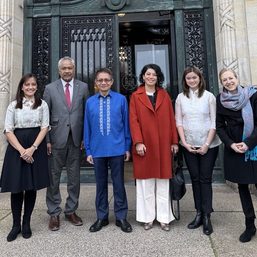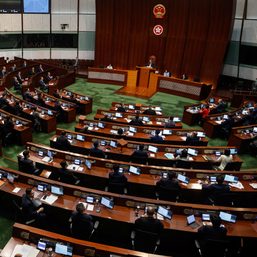SUMMARY
This is AI generated summarization, which may have errors. For context, always refer to the full article.
![[OPINION] We cannot eliminate human trafficking without understanding it first](https://www.rappler.com/tachyon/2021/08/TL-human-trafficking-1280.jpg)
Eighteen years ago, the Anti-Trafficking in Persons Act became law in the Philippines. Since then, a diverse community has shaped our response, with each member seeing a different but necessary piece of the puzzle — social workers, law enforcement, Congress, direct service providers, human rights lawyers, aid organizations, researchers, policy advocates, and, critically, victims themselves. Our perspectives may differ, but we are united by a determination to eliminate trafficking, pursue justice, and restore dignity to victims.
Together, we have the potential to make historic progress and establish the Philippines as a regional leader in anti-trafficking — but only if we choose to acknowledge what hasn’t worked. If we refuse to accept and learn from past mistakes, we will continuously fall short. And in doing so, will fail the very people we have pledged to care for. The truth is, our pace of progress has not kept up with victims’ needs or traffickers’ tactics. It’s time to reflect and evolve, to choose a more effective way forward.
From early on, the Philippines adopted the same approach to combatting human trafficking that was guiding most countries in the early 2000s: law and order was paramount. We focused on prosecution and conviction, seeing the criminal justice system as the primary vehicle for change. This approach has led to three major missteps, which the global community is finally recognizing. We must do the same.
First, a law and order approach narrowly defines success in terms of conventional metrics like conviction rates. After almost 20 years, we have substantially increased conviction rates in the Philippines — but what do these numbers really mean? Have more convictions led to fewer victims? Have they deterred would-be traffickers? We have yet to properly analyze this data or look closely at how convictions come about.
In the last year, for example, about 80% of convictions were secured through plea bargains. Plea bargaining may expedite cases, but does it get us any closer to eliminating trafficking? Or does it create conditions for perpetrators and victims to move through a revolving door? We need to be able to answer these difficult questions. We need to broaden our definition of success and integrate victims’ experiences into our metrics, if they are to be a meaningful measure of progress at all.
The second barrier to progress that was created by focusing primarily on law and order is related to resources, which have flowed disproportionately to criminal justice efforts. As a human rights lawyer who has dedicated almost 20 years to this field, I know that pursuing justice is an integral piece of the puzzle. But it’s not the only one. We need to think holistically — and apply funding holistically.
National and international resources have overwhelmingly favored prosecution-focused projects like capacity building for law enforcement. This has left direct service organizations and others scrambling to cater to funders, rather than pursue the evidence-based prevention and reintegration programming that they know to be effective — initiatives like employment training, livelihood programs, rehabilitation therapy, or education campaigns. Again, we have to ask — should prosecution and conviction be our highest goals? Has a law and order approach delivered results that justify the outsize resources its sector commands? Many of us have come to realize that allocating funding primarily to criminal justice amounts to treating the symptom, not the root cause of trafficking.
Finally, prioritizing law and order has meant placing perpetrators at the center of our efforts, effectively pushing victims to the margins. In recent years there has been a growing global call to center victims’ voices and integrate their perspectives, ideas, and solutions into policy. The time for lofty promises and politically-correct pledges to listen to victims has passed. We need those in power to acknowledge that survivors are in fact experts by experience, and they must be proactively engaged in policy development.
Victims are the key to answering our most urgent questions: who is being trafficked and why? When we know these two things, we can reset our focus, adapt our strategies, and allocate resources accordingly. Because the reality is that when most of us think of a trafficking victim, we imagine a woman being exploited in a brothel. We don’t imagine a boy being exploited in armed conflict or the mining industry. But both are trafficking victims, and both need and deserve our help.
This is why the first, critical step we must take is to conduct a national baseline study. We need to leave old assumptions behind and get an accurate sense of our current reality. Only when we see the full picture, when we know who is being trafficked and why, can we respond effectively. Without this data, we will never truly understand trafficking in the Philippines, which means we have little hope of eliminating it.
We have the dedication and the potential to achieve the vision we are striving for: a world without trafficking. But first we need the courage and collective will to change course. – Rappler.com
Cristina Sevilla is the Regional Human Rights Officer for Asia at the World Organization Against Torture (OMCT). She is a human rights lawyer specializing in torture, human trafficking, and gender-based violence. In 2014, she founded Action Against Violence and Exploitation (ACTVE), a non-profit organization providing legal aid to marginalized women and children who are victims of violence or exploitation. cse@omct.org / cssevilla@yahoo.com
Add a comment
How does this make you feel?

![[OPINION] ‘Some people need killing’](https://www.rappler.com/tachyon/2024/04/tl-some-people-need-killing-04172024.jpg?resize=257%2C257&crop_strategy=attention)
![[Judgment Call] Resisting mob mentality for warrantless arrests](https://www.rappler.com/tachyon/2024/04/judgement-call-mob-mentality.jpg?resize=257%2C257&crop=352px%2C0px%2C720px%2C720px)



There are no comments yet. Add your comment to start the conversation.